Interviews
Barry Morse - Space Refugee
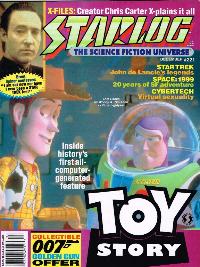
Cover title: "Space: 1999 20 Years of SF adventure"
By STEVEN ERAMO
Starlog 221 December 1995 p47-51,64
It was Lord Lew Grade, chairman of ITC (Independent Television Corporation) and Britain's foremost television mogul, who first approached actor Barry Morse when casting Professor Victor Bergman in Space: 1999. Morse found the offer tempting, but ultimately, his ride through the cosmos was a bit bumpy.
"I remember thinking, "Well, I don't know very much about science fiction, and truthfully, I'm not all that interested in it." says Morse. "I met with the people involved, producers Gerry and Sylvia Anderson, and my colleagues. Barbara Bain and Martin Landau. We had meetings about the series and I very quickly realized that there really wasn't much in the scripts that gave any clear indication as to what the characters were about.
"The script for the first episode, 'Breakaway,' had almost no explanation about the background of these people. At one of the earliest meetings, I said, 'Look, could we spend a little time talking about who these people are? What their general characters and personalities are? Perhaps a little about their background: what their parentage was, where they went to school, what tastes they have,' and so on.
"Well, they seemed not to be really interested in that very much. They wanted to talk about the clothes we were going to wear, because they were all going to be designed by some fashionable ladies' designer. It was none of my business, of course, but privately I thought this was very silly. As you saw, what we wore in Space: 1999 were simply carbon copies of what had been worn in umpteen other science fiction shows and did not show any vestige of originality."
"Scarcely any attention was paid in the scripts to the real character of those people in Space: 1999," says Morse.
It was Morse himself who gradually built up a background for his character. While this information was never incorporated into any of the scripts, it did give the actor something upon which to base his performance. "I came up with the idea that Victor Bergman had come to England as a refugee child during the reign of the Nazis, and that he might have originally been Austrian or Czechoslovakian." the actor recalls. "I built up a whole character based on that and the idea that, being somewhat older than almost all the other people on the space station, Professor Bergman could also be s described as a kind of space uncle.
"Scarcely any attention was paid in the scripts to the real character of those people in Space: 1999. Unfortunately, in my opinion, although immense attention was paid to the special FX- the models, explosions, all that- hardly any attention was paid to the actual human characters. Good dramatic material is made up out of the perplexities, conflicts, hopes and aspirations of human beings. Good dramatic series and presentations are not made up out of collisions and explosions; that's just child's play."
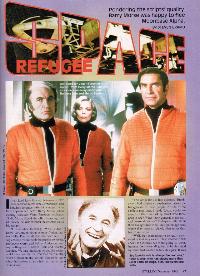
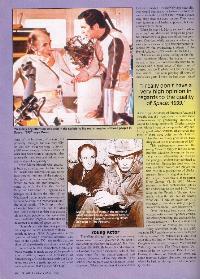
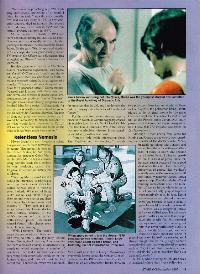
Travelling through space on a runaway moon wasn't even a glimmer in the actor's eye when he was born in London's East End on June 10, 1918. He began his education at a London Council elementary school, but soon opted for the unconventional and rougher classroom of the city streets. "The school I had to go to was run in rather primitive ways. When the teachers discovered that I was left-handed, instinctively and naturally, they would beat me to try to force me to write and work with my right hand. When I asked why, they beat me even harder. They were very ignorant and barbaric people, but one mustn't blame them."
When he was 14, Morse secured a job as an errand boy, delivering samples to potential customers of a glass manufacturing company. One day, while making a delivery, he saw a poster announcing a free public performance by the graduating students of the Royal Academy of Dramatic Art (RADA).
"I knew nothing about acting or the theatre," confesses Morse, "having never seen or read a play. I had occasionally been to the movies and a great actor of that time, of course, was the Englishman Charles Laughton, whom I had seen playing all sorts of marvellous parts. I knew he had been trained at the Royal Academy of Dramatic Art, and I thought that if I went along to watch these performances by graduating students, I would be seeing embryonic Charles Laughtons. Along I went on the appointed day and to my great astonishment, discovered that most of them were quite terrible. I didn't think they were any good at all. How arrogant of me as a youngster of 15!"
"I really don't have a very high opinion in regards to the quality of Space: 1999."
This performance prompted the young Morse to apply to RADA for an audition. Much to his surprise, he won the principal scholarship and became the youngest student ever admitted to the school. During his final term, he won the BBC Award and played the title role in a production of Shakespeare's Henry V staged in honour of the Royal Academy's then-patron King George VI. In 1936, Morse secured his first professional job as the understudy to the lead in If I Were King at the People's Theatre. One night, when the star fell ill, Morse went on. "I had to make my first entrance on the stage riding a pure, milk-white horse- very impressive."
Over the next four years, Morse worked with several repertory companies throughout England and made his first appearance in a London West End production of School for Slavery. Early television work for the BBC began in 1937 and three years later, he began making a name for himself as a character actor in such films as When We Are Married, Daughter of Darkness, Thunder Rock and the Will Hay comedy The Goose Steps Out alongside fellow newcomer Peter Ustinov.
During this time, on March 26, 1939. the actor married Sydney Sturgess, an actress whom he had met during his stint in repertory theatre.
"We're now approaching our 57th wedding anniversary, something of a record, I think, for our trade." says the actor proudly. "We had our first baby in 1943, a boy who, unfortunately, died in infancy. Our second child, Melanie, was born in 1945 and our third. Hayward, was born in 1947."
Morse travelled to Canada in 1951 and there continued honing his skills as an actor, director and occasionally writer. He also journeyed to Mexico. Australia and the United States. By the early '60s he appeared steadily in American productions, guest-starring in such TV series as Dr. Kildare (as a Romanian drug smuggler) and Wagon Train (as a drunken Irish journalist).
He also made an early visit to The Outer Limits. "Controlled Experiment" cast Morse and Carroll O'Connor as friendly and decidedly un-green Martians who land on Earth to make a thorough scientific investigation of a murder. "This episode was designed as a pilot for a proposed series." Morse reveals. "Carroll and I, along with the young man who wrote and directed it [Outer Limits creator/executive producer Leslie Stevens], thought it was a marvellously prosperous and inspired idea for a series. Unfortunately for us, there was another series about to go on the air called My Favourite Martian. Because of that, our pilot was never picked up. It would be interesting to reflect, wouldn't it, on what would have happened to Carroll O'Connor on the one hand and to me on the other if it had been made into a series."
Morse found his next long-term acting assignment much more terrestrial in nature. Throughout his time in the United States, he had often worked for producer Quinn Martin. In 1963, Martin began considering possible leads for a project he was producing called The Fugitive. His search ultimately led to Morse.
"One day Martin asked me if I would be interested in playing a recurring role in a new series for which he was about to make a pilot. I asked, 'What sort of thing is it?' and he said, 'Well, I'll get them to send you a script and then let's have lunch tomorrow and discuss it.' They sent me this script about this heroic doctor who's falsely accused of his wife's murder and the rather enthusiastic police lieutenant named Gerard who chases after him," he says, smiling.
"Well, I thought, 'They can't mean for me to play a character like this, so totally and typically United States.' You notice I don't say American- to me there is no such country as America: it's a continent which comprises a number of countries. It seemed to me that these characters were both essentially products of the United States, and I didn't think he had meant that. It turned out when we had lunch the next day that he did, and I undertook the task of playing this character of Lieutenant Gerard."
For the next four years, viewers eagerly tuned in to watch as Gerard doggedly chased his fugitive from justice, Dr. Richard Kimble (the late David Janssen). While the series was new to television viewers, it was actually an old story with a new twist.
"Here's a little inside information about The Fugitive and its structure," reveals Morse with a twinkle in his eye. "Nowadays, everybody knows about the wonderful musical based on the 19th-century novel by Victor Hugo called Les Miserables. In this story, the two principal characters are similar to those in The Fugitive, the policeman being Javert, played in the original movie by the great Charles Laughton. The name Gerard is not unlike the French name Javert. Not many people used to know, but a good many more now know, that The Fugitive was based on Les Miserables."
When approached to join the Space: 1999 cast, Morse was reluctant, "I don't know very much about science fiction, and truthfully, I'm not interested in it," he said.
Although it took nearly four years for Kimble and Gerard to see eye-to-eye regarding the murder of the doctor's wife, Morse instantly got along with Janssen and remembers the actor with great affection. "I came to know and become very fond of David. I think he regarded me as a kind of proxy uncle, or, perhaps, parent because I was a good deal older than he. The interesting thing was, of course, that we didn't actually meet in the working sense all that often. Whenever Gerard turned up in a script, David would be off and running somewhere else. The number of scenes in the whole series in which we actually played together were relatively few. In fact, David was always rather relieved to see me show up, because it would usually mean he would have a day or two off.
"David was a delightful fellow and a very skilled actor. He had much greater skills as an actor than people gave him credit for. My personal feelings were that his true range of gifts was never sufficiently used. He had a wonderfully ironic and wry sense of humour about the world in general and about himself in particular, and I always thought that he really ought to have been playing parts that were played by actors such as Cary Grant. Unfortunately, no one ever used his skills, or at least they didn't use them sufficiently."
In 1973, while visiting his children back in England where they were following in their father's footsteps at RADA. Morse was asked by Roger Moore to appear in an episode of Moore's TV series The Saint. This marked the resumption of Morse's English career and resulted in his being cast as a regular in two other crime drama series from Lew Grade's ITC, The Adventurer with Gene Barry and, later, The Zoo Gang with John Mills, Lilli Palmer and Brian Keith. After his work in the latter series. Morse found himself at Pinewood Studios outside London filming the first episode of Space: 1999.
Morse admired his cast mates, including Bain, Landau and guest stars Christopher Lee and Roy Dotrice. "They were all very good-natured and gifted people."
"We only had this one script to work on and nobody had a very clear idea as to what their characters were meant to be. I thought that the quality of the writing and overall production in general really left a lot to be desired on Space: 1999."
The second year of Space: 1999 found Professor Bergman gone. "We more or less mutually agreed that I wasn't going to go any further with it," Morse reveals.
Morse and the rest of the cast spent over a year floating through the cosmos while filming the series' first season. Although Morse feels the scripts were generally inadequate, he does recall one adventure on which he particularly enjoyed working. "An episode I thought was unusually effective was 'The Black Sun,' in which it seemed likely that Moonbase Alpha was going to be swallowed up entirely and we were all destined for oblivion.
"We pretty much improvised a good deal of that episode." says Morse. "I recall one particular scene where Martin Landau and I were sitting on the steps in the main control room, drinking brandy and thinking about what it was going to feel like to be carried out into oblivion in the next minute. That scene had a certain amount of human value- no explosions," he laughs, "just two human beings.
"Professor Bergman could be described as a kind of space uncle."
"There was another episode ["Space Brain"] which involved soap suds. There was supposed to be something encroaching on the Moonbase which took the form of a kind of overloaded washing machine, more or less," he chuckles. "It had to be shot with all these bubbles and foam, which had to pumped into the set.
"We did the first take and this foam gradually spread onto the set and filled the whole of the Moonbase. The director cut and said. 'All right, now, take two,' and everybody all looked very blank because no one had thought how we were going to get all these soap suds out of the set. It took hours and hours, the result being that by the time we came to take two, we realized that we could not stop for anything. Whatever happened, we had to keep going.
"Take two began and they started pumping in all the soap suds. Unfortunately, when the young clapper/loader- that's the boy who does the clapper board- came in front of the camera and said, 'Three-eighty-nine. Take two,' and did his clapper, he slipped on this foam and fell to the floor. Well, being the good technician that he was. he stayed put because he knew that if he got up, he would spoil the take. So, we went on playing this wretched scene whilst he was being smothered by the soap suds and foam, scarcely able to breathe. Thank God, he did survive and we all had a good laugh about it afterwards."
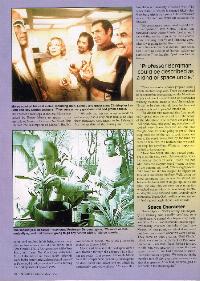
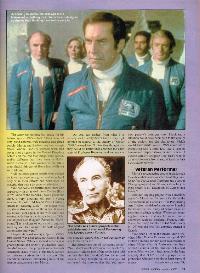
Due to Space: 1999's setting, the majority of filming was usually confined to a sound-stage. A normal day began very early, at 6:30 or 7 a.m., and lasted until late at night. "We hardly ever saw the light of day," says Morse. "At one point, we asked if we could just have one episode where we went outside. They came up with a script. 'Full Circle,' which was shot just at the back of Pinewood Studios in Black Park. We all looked forward to this but, you guessed it, when the time came to shoot it, we had a period of almost incessant rain in England. We were out in the teeming rain all day, every day, as long as we shot that episode. After that, we were glad to get back in the studio again."
The actor has nothing but praise for his fellow Space: 1999 actors. "They were all very good-natured, well-meaning and gifted people. Martin and Barbara, my two co-agitators, whom I mostly worked with, had never shot a series in the United Kingdom before and realized that things were considerably different than they were in Hollywood. Because I had worked in the UK a great deal, I felt sort of like a host while we were filming.
"All the other young people who worked on it with us were very gifted and keen, but I only wish their efforts had been used on material that was a bit more worthwhile.
"We had some wonderful guest stars who appeared with us as well. Joan Collins [Kara in "Mission of the Darians"] was a guest one time, a very pleasant and pretty young woman. My old. old friend Peter Cushing [Raan in "Missing Link"]- no longer with us, alas- also worked on the series. It was a joy to see Peter again, as my wife and I had worked with him in the theatre back in 1938. Christopher Lee [Captain Zantor in "Earthbound"] is a chum of ours and I enjoyed working with him as well. All sorts of good actors came and went."
Despite its shortcomings, Space: 1999's, first season was a success, particularly in the United States. When a second season was green-lighted, the show's production team decided to gear the program more towards American tastes, which, at the time, seemed to make sense given its U.S. success. The alterations included eliminating most of the regular cast, among them Morse.
"As you can gather from what I've already said, I really didn't have a very high opinion in regards to the quality of Space: 1999" he explains. "I think they thought that they could do better than continue the character of Professor Bergman, and we more or less mutually agreed that I wasn't going to go any further with it."
Has Morse seen any of the second series? "No. I don't watch television that much," he answers. "Aficionados of the series have told me that they liked or didn't like the second season, or they thought that the changes did not benefit the show or they did. You know how people's opinions vary. Much more attention could have been paid to the quality of the scripts and the characters, which would have made Space: 1999 much more interesting and a little less like a sort of humanized puppet show, which is what I used to unfairly compare it to. That's what it came out looking like to me, at least the bits I was involved with."
Morse's recent acting credits include such Canadian-shot series as The Great Defender, Kung Fu: The Legend Continues (as a sort of Chicago gangster) and Sirens, a show he jokingly refers to as "Daughters of Cagney and Lacey."
Another ongoing project which involves not only Morse but his entire family is the development of Canada's first Performing Arts Lodge, subsidized community housing for retired actors, many of whom have no pensions or a little savings. While such housing has been in existence for some time in countries such as England, France, Italy, Spain, Germany and the United States, only in 1993 was the first PAL complex opened in Canada.
"We hear a lot in the media, don't we, when Miss Dradle Drawers gets paid $70 million a minute for her latest rock record or when Mister Charlie Staircase has been offered a contract of $87 million for his next movie. What we don't hear about is the huge majority, that 99 1/2 percent of people in our profession who don't get those large sums of money.
"When we've been trying to promote this cause, we've been met by people saying. 'Oh. but surely, everybody in show biz is rich, aren't they?' God bless their innocence. So. we went on slogging away at this until in summer 1993. we opened the first of these Performing Arts Lodges. We hope before long that there will be another on the west coast in or near Vancouver. I. being a Canadian citizen, am naturally very much interested in these projects, particularly since I've been so fortunate in our profession, and I know that far too many people haven't been so fortunate through no fault of their own."
Nowadays, Morse and his wife Sydney divide their time between Canada, where actress daughter Melanie lives with her husband, actor Donald MacQuarrie. and daughters Vanessa and Megan-Louise, and England, where son Hayward pursues a successful career on stage. TV and radio. "About 10 years ago, my wife discovered that she has Parkinson's disease, which, as you may know, is a rather unpleasant and progressive disease affecting balance and mobility.
"She has borne with it very bravely and is still able to travel about with me, although not as much as we used to do. At the moment, she is with me here in Toronto, contributing, as I like to say. to the further ruin of our granddaughters. They're a great joy to us and that's one of the reasons we like to come back here to Toronto as often as we can."
What continues to make the business exciting for Morse? "I suppose what makes it both exciting and rewarding is when what you have been seeking to do is actually received and perceived by the audience, or customers as I call them, as being more or less what you have been attempting to deliver."
With a career spanning more than a half- century. Barry Morse has so far played more than 2,000 parts on stage, film, television and radio. But, is there any one role that he has found particularly difficult or challenging? "The most challenging role is always the next one." he says. "Whether or not it's going to be difficult is. of course, another matter, but I've always been able to look forward to challenges and to cherish and enjoy them.
"Many actors in today's world, or so- called actors, usually referred to as movie stars, don't really do much in the way of acting, as I understand it. They pull the same faces and make the same noises they get out of bed with in the morning. It's their managers who are able to market a career out of all that, but it's not what I grew up believing was acting.
"The whole of my career, such as it has been, has been an attempt to explore and enlarge whatever natural gifts I may have, and by the day-to-day practice of those natural gifts, to try to expand and polish them. I like investigating and. if possible, creating, or at least examining, all sorts of human characteristics. To that extent, my favourite role is always the next one."